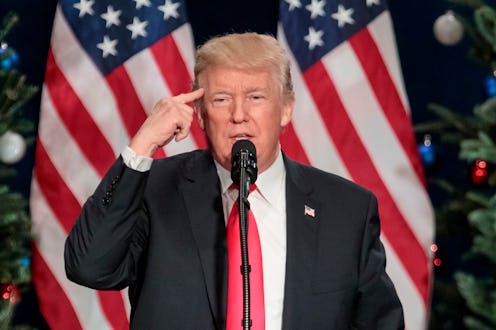News
Trump Acknowledges World AIDS Day, But Not The LGBTQ Community

Ahead of Dec. 1's World AIDS Day, President Trump released a remembrance statement honoring the lives lost, the history of AIDS in the United States, and global efforts to fight the disease. However, in the more than 600-word long proclamation, Trump failed to mention the LGBTQ community that AIDS disproportionately affects:
Due to America's leadership and private sector philanthropy and innovation, we have saved and improved millions of lives and shifted the HIV/AIDS epidemic from crisis toward control. We are proud to continue our work with many partners, including governments, private-sector companies, philanthropic organizations, multilateral institutions, civil society and faith-based organizations, people living with HIV, and many others.
You can read Trump's entire World AIDS Day statement online. The LGBTQ community is an intrinsic part of both the history of AIDS and the discussion over HIV prevention. As past administrations have explicitly mentioned LGBTQ groups, Trump's erasure of the entire community drew criticism from civil rights groups.
One response came from Lambda Legal's HIV Project Director Scott Schoettes, who released a statement online:
Given President’s Trump lack of a substantive plan or strategy for addressing the domestic HIV/AIDS epidemic, his inability to even make an informed statement about it is extremely disappointing, though not surprising.
Both Lambda Legal and the Human Rights Campaign mentioned that the policies Trump support could lead to slashed funding for HIV care and prevention.
Today, more than 1.1 million people in the United States are diagnosed with HIV and 1 in 7 of them don't know it, according to the U.S. Department of Health and Human Services. The majority of the cases are in gay and bisexual men, of whom young African-American men are most affected. Southern states — from Virginia through Texas — accounted for half the new infections in 2014.
HIV is a lifelong virus. It attacks the immune system and if left untreated, can advance to life-threatening AIDS. Since the AIDS epidemic began in the early 1980s, more than 1.2 million people in the United States have been diagnosed with AIDS, according to Health and Human Services.
In his World AIDS Day proclamation, Trump attributed "sustained public and private investments in HIV prevention and treatment" to the decline in annual HIV infections. But Trump also supported this past summer's attempt to repeal the Affordable Care Act, limiting the expansion of and cutting the federal spending on Medicaid. Under Obama's Affordable Care Act, increased Medicaid coverage in expansion states led to a nationwide increase in coverage for people with HIV in 2014, according to an analysis by the Kaiser Family Foundation. The Affordable Care Act also helps lower prescription drug costs for Medicare recipients, which benefits people living with HIV/AIDS who take antiretroviral medicines for their HIV treatment. Now Medicaid funding is at stake because of the Republican-pushed tax plan that could cut federal Medicaid spending — a tax plan that Trump supports.
Furthermore in his World AIDS Day statement, Trump praised PEPFAR, a U.S. government initiative to combat HIV/AIDS worldwide. But his fiscal year 2018 budget proposal would cut more than $1 billion from PEPFAR and the Global Fund to Fight AIDS, Tuberculosis and Malaria. Trump's initial budget plan, however, does preserve funding for Ryan White HIV/AIDS, programs which provide health care to people living with HIV who cannot get health insurance.
"Pretending to recognize World AIDS Day while proposing to slash PEPFAR's budget by $1 billion is downright insulting," said Joel Kasnetz, a spokesperson for the Democratic National Committee, to the Washington Blade. "Trying to erase LGBTQ people from the history of HIV/AIDS is another slap in the face."
At the time of writing, Trump had not addressed the criticism for excluding LGBTQ groups from his World AIDS Day proclamation. This isn't the first time Trump has let down the LGBTQ community, from removing LGBTQ mentions on the White House website to selecting a vice president who said he's in favor of allocating taxpayers' dollars to "gay conversion" therapy. For those who want to support the LGBTQ community from the ground up, consider donating time or money to local grassroots organizations.